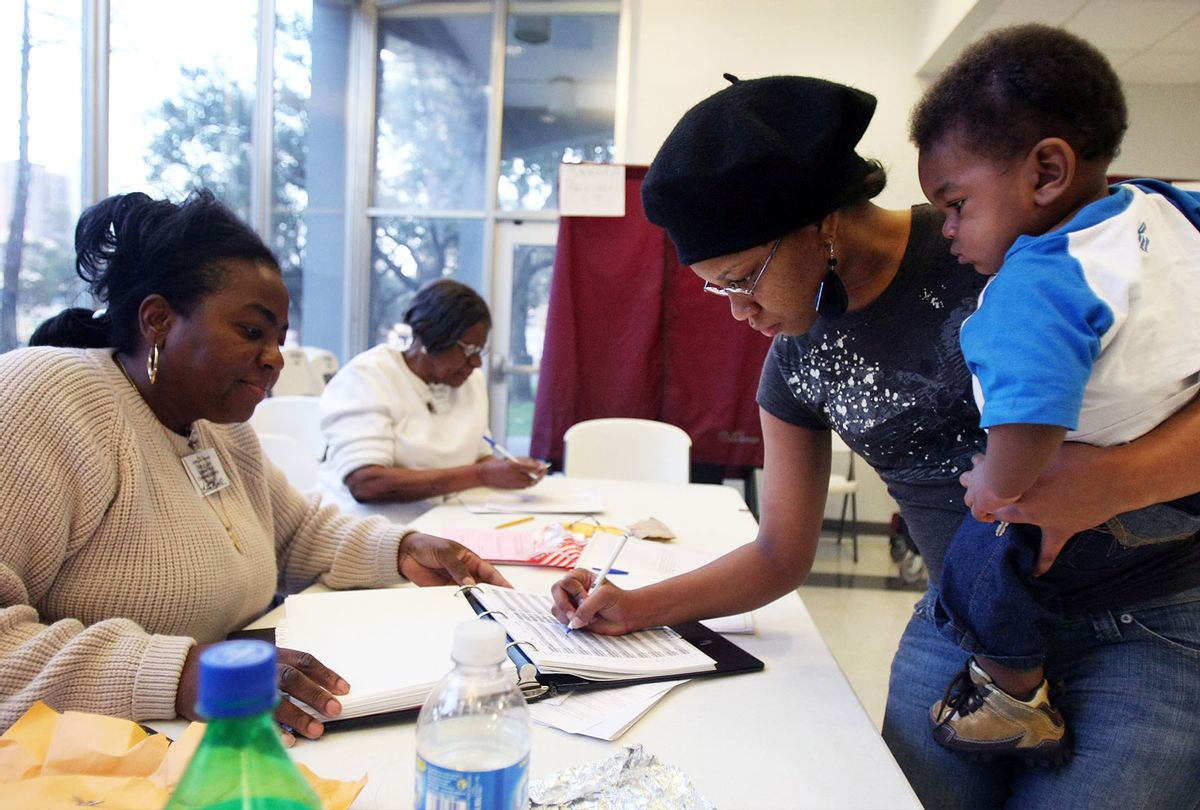A North Carolina court on Friday struck down a Republican voter ID law that it said was intended to discriminate against Black voters.
A 2-1 majority of the Wake County Superior Court ruled that the 2018 law "was motivated at least in part by an unconstitutional intent to target African American voters." The majority opinion said that the law was "motivated in part for a discriminatory purpose" and "would not have been enacted in its current form but for its tendency to discriminate against African American voters."
Republican state lawmakers first passed a voter ID law in 2013 but a court ruled that it was explicitly designed to discriminate against Black voters, writing that lawmakers relied on data that sought to "target African-Americans with almost surgical precision." Voters in 2018 backed a referendum to require photo ID to cast a ballot and Republicans rushed through a new version of their law during a lame-duck session shortly after Democrats won enough seats to end the GOP's veto-proof supermajority in the legislature. The new version expanded the number of acceptable forms of ID but the court ruled Friday that the new law written after the referendum also discriminated against Black voters, citing an analysis finding that Black voters are more than twice as likely to lack a photo ID than white voters and are more likely to face undue burdens because of disproportionate poverty rates.
A group of Black voters who brought the lawsuit wrote in their complaint that the voter ID law would require "voters to take time away from work, forgo compensation, and arrange or pay for transportation to travel for potentially hours," creating an "undue burden" or even an "insurmountable barrier" to voters who simply want to cast a ballot.
Want a daily wrap-up of all the news and commentary Salon has to offer? Subscribe to our morning newsletter, Crash Course.
While the court did not find racist intent by Republican lawmakers who passed the law, they wrote that the law targeted Black voters for political reasons.
"We do not find that any member of the General Assembly who voted in favor of (voter ID) harbors any racial animus or hatred towards African American voters, but rather ... that the Republican majority 'target[ed] voters who, based on race, were unlikely to vote for the majority party," the majority opinion said. "Even if done for partisan ends, that constitute[s] racial discrimination.'"
The judges also criticized the way the law was passed after courts found that the state's 2011 Republican gerrymander was unconstitutional because it sought to dilute the voting power of Black voters.
The voter ID law is "the only legislation implementing a constitutional amendment ever to be enacted in a post-election lame duck session in North Carolina," Judges Michael O'Foghludha and Vince Rozier Jr. wrote, and only happened after another court ordered Republicans to redraw the district maps.
That "suggests that Republicans wanted to entrench themselves by passing their preferred, and more restrictive, version of a voter ID law," they wrote.
Friday's ruling showed that "the state's Republican-controlled legislature undeniably implemented this legislation to maintain its power by targeting voters of color," Allison Riggs, the lead attorney in the case, said in a statement.
Republicans vowed to appeal Friday's ruling. An appeals court last year blocked the law from being enforced while the case was heard.
The ruling comes as other Republican-led states, motivated by former President Donald Trump's false narrative blaming his election defeat on spurious allegations of voter fraud, have passed new voter ID laws and other restrictions aimed at preventing illegal voting, even though data has repeatedly shown that is virtually nonexistent.
"It is more likely that an American will be struck by lightning than that he will impersonate another voter at the polls," the Brennan Center for Justice said in a report investigating the prevalence of voter fraud.
An extensive state audit after the 2016 election found just 508 possible fraud cases out of 4.8 million votes, and only one of those involved someone impersonating another voter at the polls. Ironically enough, that was a Trump voter who voted illegally on behalf of her deceased mother. Most of the other cases involved former felons voting before they had ended periods of probation or parole. Another North Carolina court found last month, coincidentally, that the state's felon disenfranchisement law is unconstitutional.
At least 35 states have voter ID laws on the books but not all of them require a photo ID as North Carolina's law would. Eighteen states have photo ID requirements but accept varying forms of identification.
"Other, less restrictive voter ID laws would have sufficed to achieve the legitimate nonracial purposes of implementing the constitutional amendment requiring voter ID, deterring fraud, or enhancing voter confidence," the majority opinion said.
North Carolina's law faces additional lawsuits in state and federal court. The NAACP has filed a challenge to the law's constitutionality in federal court and has also filed a separate state lawsuit arguing that the legislature did not have the right to put the constitutional amendment on the 2018 ballot because Republicans only had the requisite supermajority as the result of their illegal gerrymander.



Shares